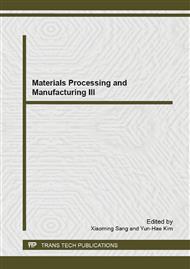p.1287
p.1291
p.1295
p.1299
p.1303
p.1308
p.1314
p.1318
p.1324
A Refined Mesh Generation Method for Arbitrary Three-Dimensional Geometry of Casting
Abstract:
A grid generation method for the three-dimensional arbitrary complex geometry of casting is introduced for the foundry simulation. The approach of a STL (STereo Lithography) model from CAD to a distance field is described in detail. The mesh generated by this approach is based on a fully threaded tree and refined at specific positions according to the distance field. This algorithm may make the mesh become fine at the surface and coarse inside. Several examples are provided to validate this algorithm.
Info:
Periodical:
Pages:
1303-1307
Citation:
Online since:
August 2013
Authors:
Price:
Сopyright:
© 2013 Trans Tech Publications Ltd. All Rights Reserved
Share:
Citation:


